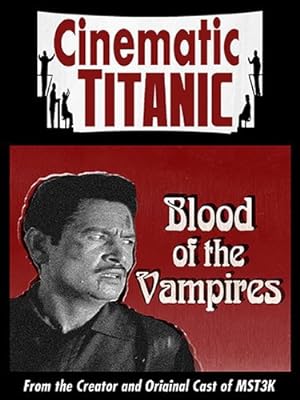Blood of the Vampires, also known as Whisper to the Wind on IMDb or Curse of the Vampires in posters, was a Filipino horror film made in the 1960s. While not as intriguing as its predecessor, but unrelated film, The Blood Drinkers, Blood of the Vampires seems to be a horror movie with a deeper political and social significance regarding corruption in established power structures as reinforced by wealth and family. If you watch Filipino cinema today, it is far grittier and deals with more straightforward and realistic themes, but you trace its tragic roots to early films like Blood of the Vampires.
Blood of the Vampires is about a family plagued by the curse of vampirism that was originally confined but kept alive and now threatens to turn into a village outbreak that will consume everyone near the family. Another supernatural force struggles to stop the evil from spreading. It was hard to tell if Blood of the Vampires was a period piece or shot as the style of that time, but I am going to assume the prior. Blood of the Vampires has a lot of Spanish influences in the costume. Blood of the Vampires was more explicitly Gothic in style and melodramatic in terms of story line. Blood of the Vampires feels like Jane Eyre with vampires, but the guy in power is more of a jerk, and everything feels more hopeless.
I still would not recommend Blood of the Vampires for one simple reason: black face for the servants. I was not expecting to watch some B grade foreign vampire film and get slapped in the face by racism. I don’t chill at home and catch an Al Jolson film or the original Birth of the Nation. If I don’t have to watch those films for a film [and/or] history class, I don’t need to watch that fuckery for fun. On the other hand, maybe it is the perfect vampire film for these times since explicit racism is back in vogue.
S
P
O
I
L
E
R
S
Blood of the Vampires effectively examines the parasitic nature of a patriarchal society so if someone can convincingly argue that the black face was a critique, which it did not seem to be, then maybe I will lift my condemnation. I saw the black face as an assumption that servants/slaves are black, which was particularly galling given the fact that this film was made in a country other than US. I know racism is global, but in a Filipino vampire movie, it is particularly galling and extraneous.
Otherwise Blood of the Vampires did a great job of showing how reluctance to let go of power and wealth can lead to further corruption, corrosion of character, self-destruction, deviancy and collapse of the broader society. An elderly father tells his son to destroy the house after he dies. The son is outraged because it is his inheritance, and he discovers that his mom is a vampire locked away in the house. The father did not want the son to discover this secret and just wanted the problem immediately. Isn’t vampirism the perfect analogy to how we are unwilling to address historical wrongs and expect it to just go away with no consequences?
I am not really sure how vampirism actually works in Blood of the Vampires. The father seems to think that everyone in the family is a carrier thus he refuses to let his daughter get married to her true love. The son chooses to be a vampire-he takes off his cross and lets his mother bite him. I originally thought that he was just being an idiot because the vampire is his mom, but no, I think there is an incestuous theme to the whole movie. The son supplants his father, inherits everything, terrorizes and dominates the locals, wants all the women, including his sister. Damn the consequences. There is an implicit assumption that this family dominates the community in terms of wealth and power. Blood of the Vampires seems to make the whole set up feel feudal.
There are only two elements that can stop him: first, the Catholic Church and second, the sister’s true love who gets killed due to sabotage from the brother. Did Blood of the Vampires influence Ghost? In the end, the vampire outbreak is eliminated because the sister dies as well, but because she is not evil and always resisted her brother, she gets to spend eternity with her true love, which is a very Spanish resolution in movies by Guillermo del Toro (Pan’s Labyrinth) and filmmakers influenced by him (The Orphanage), the idea of death as a happy ending where one’s spirit can finally be free and can exist how he or she wanted to live.
Blood of the Vampires is definitely my favorite type of horror movie-a vampire flick with a deeper sociological meaning, but I take away all points for racism.
Stay In The Know
Join my mailing list to get updates about recent reviews, upcoming speaking engagements, and film news.





